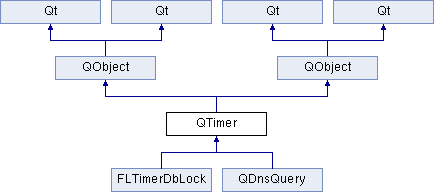|
Eneboo - Documentación para desarrolladores
|
|
Eneboo - Documentación para desarrolladores
|
The QTimer class provides timer signals and single-shot timers. Más...
#include <qtimer.h>

Señales | |
| void | timeout () |
| void | timeout () |
Métodos públicos | |
| QTimer (QObject *parent=0, const char *name=0) | |
| ~QTimer () | |
| bool | isActive () const |
| int | start (int msec, bool sshot=FALSE) |
| void | changeInterval (int msec) |
| void | stop () |
| int | timerId () const |
| QTimer (QObject *parent=0, const char *name=0) | |
| ~QTimer () | |
| bool | isActive () const |
| int | start (int msec, bool sshot=FALSE) |
| void | changeInterval (int msec) |
| void | stop () |
| int | timerId () const |
Métodos públicos estáticos | |
| static void | singleShot (int msec, QObject *receiver, const char *member) |
| static void | singleShot (int msec, QObject *receiver, const char *member) |
Métodos protegidos | |
| bool | event (QEvent *) |
| bool | event (QEvent *) |
The QTimer class provides timer signals and single-shot timers.
It uses timer events internally to provide a more versatile timer. QTimer is very easy to use: create a QTimer, call start() to start it and connect its timeout() to the appropriate slots. When the time is up it will emit the timeout() signal.
Note that a QTimer object is destroyed automatically when its parent object is destroyed.
Example:
QTimer *timer = new QTimer( myObject ); connect( timer, SIGNAL(timeout()), myObject, SLOT(timerDone()) ); timer->start( 2000, TRUE ); // 2 seconds single-shot timer
You can also use the static singleShot() function to create a single shot timer.
As a special case, a QTimer with timeout 0 times out as soon as all the events in the window system's event queue have been processed.
This can be used to do heavy work while providing a snappy user interface:
QTimer *t = new QTimer( myObject ); connect( t, SIGNAL(timeout()), SLOT(processOneThing()) ); t->start( 0, FALSE );
myObject->processOneThing() will be called repeatedly and should return quickly (typically after processing one data item) so that Qt can deliver events to widgets and stop the timer as soon as it has done all its work. This is the traditional way of implementing heavy work in GUI applications; multi-threading is now becoming available on more and more platforms, and we expect that null events will eventually be replaced by threading.
Note that QTimer's accuracy depends on the underlying operating system and hardware. Most platforms support an accuracy of 20ms; some provide more. If Qt is unable to deliver the requested number of timer clicks, it will silently discard some.
An alternative to using QTimer is to call QObject::startTimer() for your object and reimplement the QObject::timerEvent() event handler in your class (which must, of course, inherit QObject). The disadvantage is that timerEvent() does not support such high-level features as single-shot timers or signals.
Some operating systems limit the number of timers that may be used; Qt tries to work around these limitations.
| QTimer::QTimer | ( | QObject * | parent = 0, |
| const char * | name = 0 |
||
| ) |
Constructs a timer called name, with the parent parent.
Note that the parent object's destructor will destroy this timer object.
| QTimer::~QTimer | ( | ) |
Destroys the timer.
| QTimer::QTimer | ( | QObject * | parent = 0, |
| const char * | name = 0 |
||
| ) |
| QTimer::~QTimer | ( | ) |
| void QTimer::changeInterval | ( | int | msec | ) |
Changes the timeout interval to msec milliseconds.
If the timer signal is pending, it will be stopped and restarted; otherwise it will be started.
| void QTimer::changeInterval | ( | int | msec | ) |
This virtual function receives events to an object and should return TRUE if the event e was recognized and processed.
The event() function can be reimplemented to customize the behavior of an object.
Reimplementado de QObject.
| bool QTimer::isActive | ( | ) | const |
| bool QTimer::isActive | ( | ) | const [inline] |
Returns TRUE if the timer is running (pending); otherwise returns FALSE.
This static function calls a slot after a given time interval.
It is very convenient to use this function because you do not need to bother with a timerEvent or to create a local QTimer object.
Example:
#include <qapplication.h> #include <qtimer.h> int main( int argc, char **argv ) { QApplication a( argc, argv ); QTimer::singleShot( 10*60*1000, &a, SLOT(quit()) ); ... // create and show your widgets return a.exec(); }
This sample program automatically terminates after 10 minutes (i.e. 600000 milliseconds).
The receiver is the receiving object and the member is the slot. The time interval is msec.
Starts the timer with a msec milliseconds timeout, and returns the ID of the timer, or zero when starting the timer failed.
If sshot is TRUE, the timer will be activated only once; otherwise it will continue until it is stopped.
Any pending timer will be stopped.
| void QTimer::stop | ( | void | ) |
Stops the timer.
| void QTimer::stop | ( | ) |
| void QTimer::timeout | ( | ) | [signal] |
This signal is emitted when the timer is activated.
| void QTimer::timeout | ( | ) | [signal] |
| int QTimer::timerId | ( | ) | const [inline] |
Returns the ID of the timer if the timer is running; otherwise returns -1.
| int QTimer::timerId | ( | ) | const [inline] |
 1.7.4
1.7.4